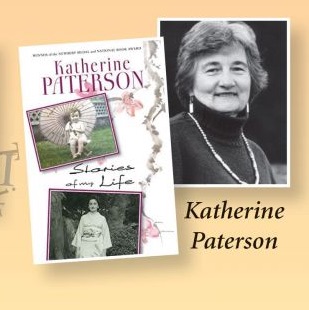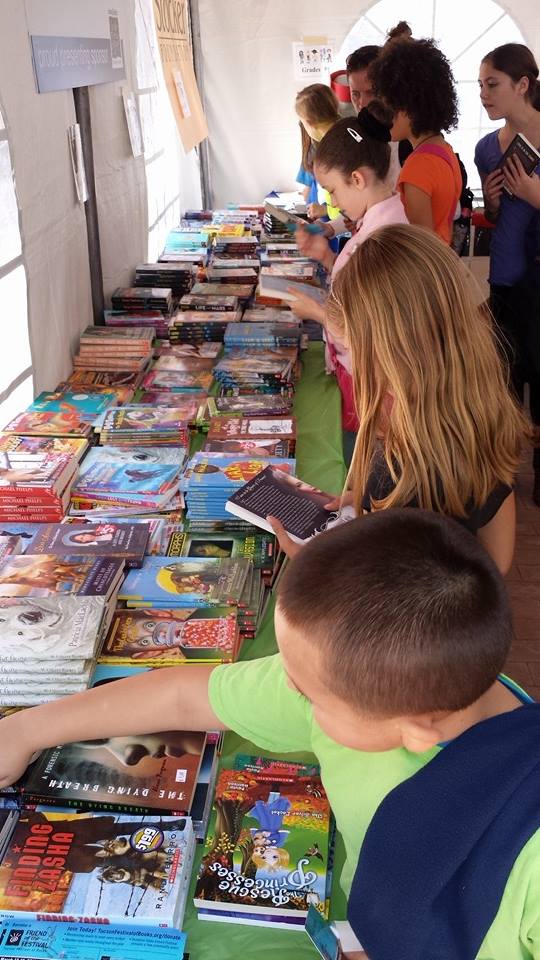By Kathy Short, The University of Arizona
 The blogs for this month highlight our reflections on authors’ discussions of global and multicultural issues in children’s and young adult literature. These authors appeared on panels at the Tucson Festival of Books on March 14-15, 2015. We each selected a particular panel to share the dialogue that emerged between authors around an issue, such as resistance, cultural influences, and scientific writing. This first column is a brief description of the festival and the opening keynote by Katherine Paterson.
The blogs for this month highlight our reflections on authors’ discussions of global and multicultural issues in children’s and young adult literature. These authors appeared on panels at the Tucson Festival of Books on March 14-15, 2015. We each selected a particular panel to share the dialogue that emerged between authors around an issue, such as resistance, cultural influences, and scientific writing. This first column is a brief description of the festival and the opening keynote by Katherine Paterson.
 The Tucson Festival of Books is a celebration of books, authors and the power of stories that is held on the University of Arizona campus every March. We are in our seventh year of working together as a group of 1800 community volunteers to coordinate a festival with 400 authors and 135,000 attendees over the two days. The festival is a non-profit free event with proceeds going to community literacy organizations. The children’s and teen strand highlights 60 award-winning authors and illustrators who present in panels, workshops, and studio sessions aimed at varying audiences from children to adults. The panels provide a venue for authors to interact with each other about key issues in the field and to have fun around a topic of interest. The workshops range from hands-on activities with children to panels for adults on writing and illustrating books and getting published. The studio sessions involve illustrators demonstrating a particular technique or medium. A parent/educator strand of sessions highlight recommended books and ways of engaging children with books and reading.
The Tucson Festival of Books is a celebration of books, authors and the power of stories that is held on the University of Arizona campus every March. We are in our seventh year of working together as a group of 1800 community volunteers to coordinate a festival with 400 authors and 135,000 attendees over the two days. The festival is a non-profit free event with proceeds going to community literacy organizations. The children’s and teen strand highlights 60 award-winning authors and illustrators who present in panels, workshops, and studio sessions aimed at varying audiences from children to adults. The panels provide a venue for authors to interact with each other about key issues in the field and to have fun around a topic of interest. The workshops range from hands-on activities with children to panels for adults on writing and illustrating books and getting published. The studio sessions involve illustrators demonstrating a particular technique or medium. A parent/educator strand of sessions highlight recommended books and ways of engaging children with books and reading.
Katherine Paterson opened the children’s and teen strand this year by talking about her new book, Stories of My Life (Dial, 2014). The book began as a collection of stories from her life to share with her own family but then developed into a broader focus as she connected these stories to characters, events, and locations in her children’s books. She shares many vignettes about her experiences growing up as a child in China, where her parents were missionaries at a time of political unrest, war, and hunger, as well as her own adult missionary life in Japan. She also writes of her life as a mother and as a wife of a Presbyterian minister, ending with the recent death of her husband. The book is not a memoir, with a single cohesive narrative, but a compilation of anecdotes that reflect her warm, self-effacing humor and humility.
One vignette focused on the four years she spent in Japan. She grew up in China at a time when Japan was the enemy who bombed and devastated that country and whose soldiers committed atrocities. Her home was occupied by Japanese soldiers and her family was twice forced to leave China due to the Japanese occupation and so she hated and feared the Japanese as a child. The bombing of Pearl Harbor led her to fervently collecting scraps and buying war savings stamps to defeat the Japanese because she feared they would invade San Francisco. She trained for missionary service, expecting to go to Taiwan, and so the news that she was being sent to Japan was unexpected and disappointing. Her experiences and deep relationships in Japan, of course, shifted her perspectives and she says that her development as a writer grew out of being loved by the people she thought she hated.
One last quick note, Katherine’s book, The Great Gilly Hopkins, has been made into a movie based on a script by her son David that will hopefully be released in Fall 2015. Also be sure to put March 12-13, 2016 on your calendars for the 2016 Tucson Festival of Books.
Kathy G. Short, University of Arizona
Journey through Worlds of Words during our open reading hours: Monday-Friday, 9 a.m. to 5 p.m. and Saturday, 9 a.m. to 1 p.m. To view our complete offerings of WOW Currents, please visit archival stream.
- Themes: Kathy Short
- Descriptors: Interviews & Profiles, WOW Currents
